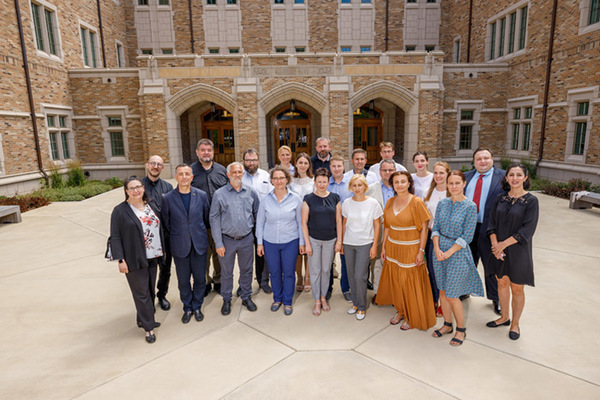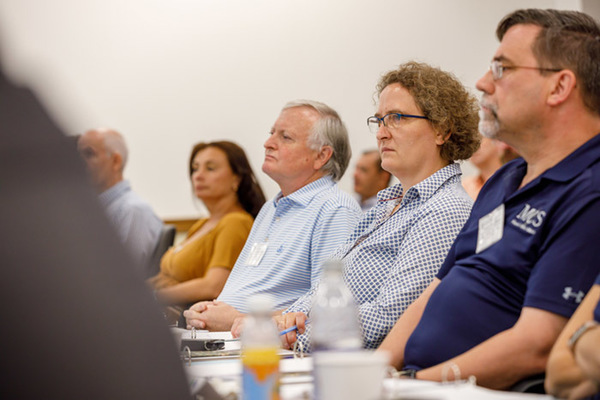
Fr. Edward Sorin, C.S.C., founder of the University, imagined Notre Dame as a “powerful force for good” in the world. The Nanovic Institute for European Studies has sought to embody this vision through its commitment to the Catholic Universities Partnership.
Addressing a critical need to support university leaders in post-Soviet and post-communist countries of Eastern Europe, the Institute provides an annual, week-long Leadership Institute on the South Bend campus. The Catholic Leadership Institute is run in conjunction with Nonprofit Certificate Education at Mendoza College of Business and is directed by Nanovic Senior Associate Director, Monica Caro.
“Working at the university we are appointed as teachers and researchers. Then, usually all of a sudden, we are chosen to be leaders," said Ewa Domagała-Zyśk, Vice-Dean for Research and Internationalization of the Faculty of the Social Sciences at the John Paul II Catholic University of Lublin. "That is why this course is a must for any new leader.” Domagała-Zyśk participated in the leadership training this past summer. Now in its third year, this program has served almost 60 leaders from post-Soviet Central and Eastern Europe.
 Ewa Domagała-Zyśk (center), Vice-Dean for Research and Internationalization of the Faculty of Social Sciences John Paul II Catholic University of Lublin, Poland
Ewa Domagała-Zyśk (center), Vice-Dean for Research and Internationalization of the Faculty of Social Sciences John Paul II Catholic University of Lublin, Poland
The 2019 Nanovic program hosted 21 administrators and leaders who came from a wide variety of disciplines and leadership positions. The group included delegations from Catholic universities in Croatia, Georgia, Hungary, Poland, Slovakia, and Ukraine. The Nanovic participants joined another two dozen participants from around the globe in a course that included philanthropy development, strategic planning, organizational evaluation, and leadership skills.
Participants have been overwhelmingly enthusiastic. One writes that the week served “as a journey for me, from burnout to enrichment . . . I feel that in spite of my fear of how to change the culture of an organization, I can start with small things and let my example lead the way.” Another shared that the instruction “allowed me to see myself as a leader” and that “I would like to imitate, in my work, the culture of the organization that I met here at Notre Dame.”
Caro, who collaborated on the curriculum design and taught in the program, commented that “it was particularly gratifying to hear participants eagerly discussing a desire to connect with past participants to gain greater momentum for changes and developments. When the program was conceived, we hoped for exactly that: an ever-increasing core group of leaders at each of our partners who could share a vocabulary and methodology for leadership to translate into their own organizations. I am hopeful that the program will continue to support the flourishing of these universities.”
Selected from a competitive pool of more than 50 applicants, all 21 participants received funding to attend the training program, including airfare, accommodations, and all instructions and materials. Participants were also able to experience a screening of Notre Dame’s iconic Rudy and a minor league baseball game in South Bend. All of this was made possible this year by the generous support from the Fund to Aid the Catholic Church in Central and Eastern Europe of the United States Conference of Catholic Bishops (USCCB) and a generous donation from Nanovic Institute advisory board member James Hummer.
Playing a key role in the internationalization of Notre Dame, the Nanovic Institute for European Studies is a teaching and research institute of the Keough School of Global Affairs. It serves as an integrated, interdisciplinary home for students and faculty to explore the evolving ideas, cultures, beliefs, and institutions that shape Europe today.
2019 Participants
- Dr. Angela Almasiova, Vice‐Dean in Charge of Education, Catholic University in Ružomberok, Slovakia
- Prof. Gordan Črpić, Vice‐Rector for Organization and Financial Affairs, Catholic University of Croatia, Croatia
- Dr. Dimitry Gegenava, Vice‐Rector and Chair of the Center for American Law and Legal Philosophy, Sulkhan‐Saba Orbeliani Teaching University, Georgia
- Dr. Ewa Domagala‐Zysk, Vice‐Dean for Research and Internalization of the Faculty of Social Sciences and Professor of Pedagogy, John Paul II Catholic University of Lublin, Poland
- Dr. Juraj Holdoš, Member of the Faculty Senate and Assistant Professor of Psychology, Catholic University in Ružomberok, Slovakia
- Rev. Rafal Huzarski, SJ, Director of the Arrupe Center, Warsaw, Poland
- Dr. Pavel Izrael, Chair of the Department of Journalism, Catholic University in Ružomberok, Slovakia
- Nino Katamadze, Assistant of Faculty of Law, Head of Georgian, German and Comparative Centre, Sulkhan‐Saba Orbeliani Teaching University, Georgia
- Mr. Andriy Khimyak, Head of the Grants Management Department, Ukrainian Catholic University, Ukraine
- Dr. Svitlana Khyliuk, Academic Director of Master Program in Human Rights and Associate Professor of Theory of Law and Human Rights Department, Ukrainian Catholic University, Ukraine
- Prof. Krzysztof Mielcarek, Chair of the Department of Exegesis of the Gospels and Apostolic Writing at the Institute of Biblical Studies, Faculty of Theology, John Paul II Catholic University of Lublin, Poland
- Dr. Roko Mišetić, Chair of the Sociology Department, Catholic University of Croatia, Croatia
- Sarolta Molnár, Assistant Professor of Law and Head of the Dean’s Office, Pázmány Péter Catholic University, Hungary
- Mrs. Suzana Obravac Lipar, Head of the Public Relations Office, Catholic University of Croatia, Croatia
- Dr. Marianna Pyrih, Head of the Research Support Office, Ukrainian Catholic University, Ukraine
- Prof. Marketa Rusnakova, Vice‐Dean for Foreign Relations and Public Relations and Associate Professor of Social Work, Catholic University in Ružomberok, Slovakia
- Mrs. Natia Shekiladze, Head of Quality Assurance Service, Sulkhan‐Saba Orbeliani Teaching University, Georgia
- Rev. Prof. Marcin Skladanowski, Associate Professor of Theology and Professor of Russian Literature and Society, Member of the University Commission for Education and Secretary of the Commission for the Quality of Education, John Paul II Catholic University of Lublin, Poland
- Dr. Svitlana Stelmakh, Dean of Faculty of Health Sciences, Ukrainian Catholic University, Ukraine
- Rev. Krzysztof Smykowski, Ph.D., Assistant Professor of Moral Theology and Bioethics and Secretary of the Institute of Moral Theology, John Paul II Catholic University of Lublin, Poland
- Rev. Dr. Martin Uhál, Associate Professor of Theology and Chair of the Alexander Spetz Institute of Applied Ethics, Catholic University in Ružomberok, Slovakia